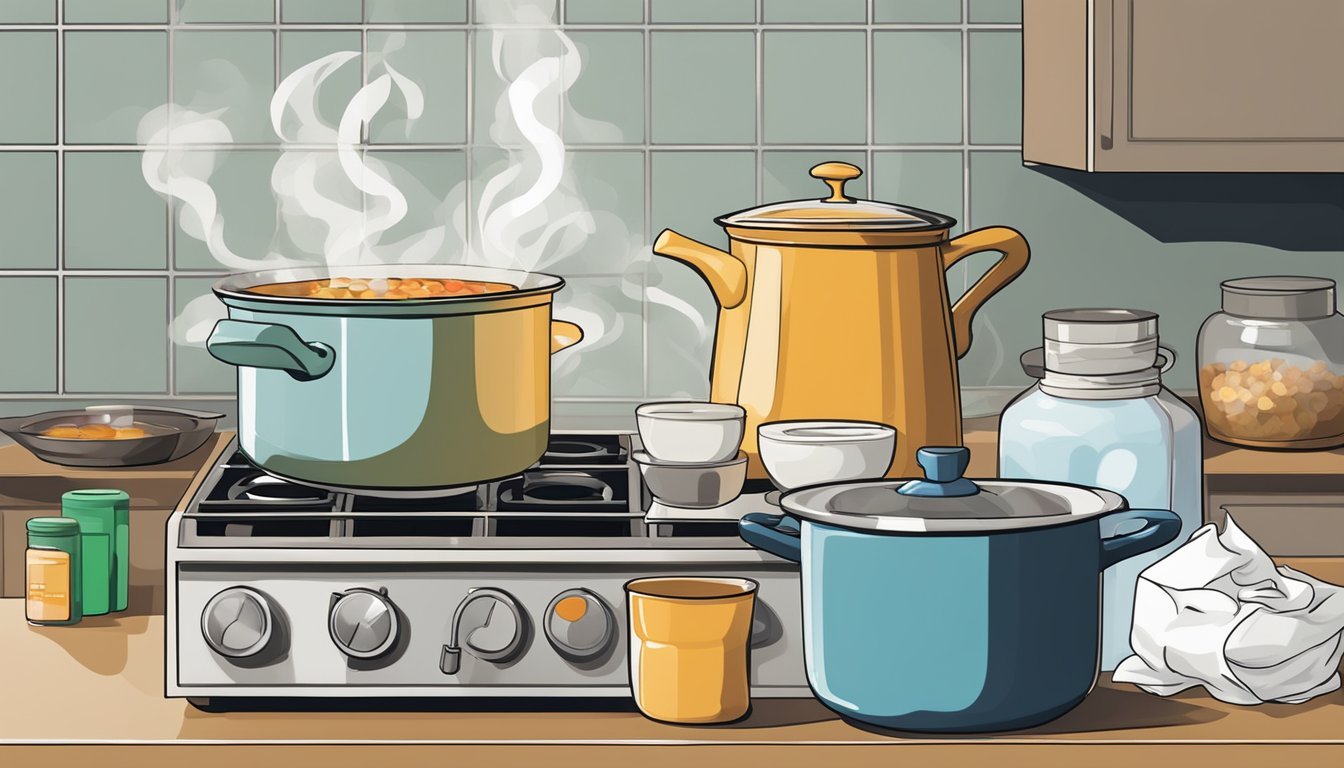How to Cook When You're Sick
Simple, Nutritious Meal Ideas
When under the weather, cooking may seem like a daunting task. However, it's crucial to nourish the body with the right foods to aid in the recovery process. Simple, comforting recipes that require minimal effort can provide the sustenance needed without overextending one's limited energy. Choosing easy-to-digest meals with a good balance of nutrients can help one feel better while fighting off illness.
Meals prepared in devices such as an Instant Pot or a slow cooker can be particularly helpful for those who are sick. These kitchen tools allow for a hands-off approach to cooking, ensuring that individuals do not have to stand over a stove when they are not feeling well. Chicken soup, for instance, is a classic go-to meal that not only hydrates but also delivers essential vitamins and protein.
One should opt for light broths and soups (What wine goes well with soups?), cooked vegetables (how long do cooked vegetables last?), and soft foods like oatmeal or yogurt. These are gentle on the stomach and can alleviate symptoms of sickness. Additionally, incorporating garlic and ginger into dishes can offer immune-boosting benefits. Preparing meals during a period of good energy and storing them for later can also reduce the need to cook when symptoms peak.
Understanding Your Nutritional Needs While Sick
When someone is sick, their body requires additional nutrients and hydration to help fight off illness and recover more quickly. Selecting the right foods and fluids is essential to bolster the immune system and maintain overall health during this time.
Boosting Your Immune System with the Right Foods
The immune system benefits significantly from foods rich in vitamins, minerals, and protein. It is particularly important to consume foods that can provide:
Vitamins such as Vitamin C and Vitamin E: These can be found in fruits like oranges and berries, and vegetables such as spinach (What wine goes well with spinach?) and broccoli.
Protein: Lean meats, such as chicken, which can be easily digested in the form of chicken soup, provide essential amino acids to help the body's immune response.
Zinc: Foods like beans, nuts, and seeds contain this nutrient, which is crucial for immune function.
Below is a list of specific nutrients that aid in immune health and the foods they are commonly found in:
Nutrients Food Sources Vitamin C Citrus fruits, bell peppers, kiwifruit Vitamin E Almonds, sunflower seeds, spinach Protein Chicken, turkey, seafood, tofu Zinc Chickpeas, lentils, pumpkin seeds
The Importance of Hydration and Warm Liquids
Hydration plays a pivotal role in maintaining health while sick. It helps to:
Keep the mucous membranes moist: This reduces the chances of infections worsening.
Assist in temperature regulation: Especially important if one has a fever.
Warm liquids, such as tea, are particularly soothing, as they can provide the following benefits:
Relief to sore throats: Heat and hydration assist in relieving throat irritation.
Decongestant properties: Warmth helps clear nasal passages.
Incorporating herbal teas, such as ginger or peppermint, can also provide additional relief. They contain antioxidants and can have anti-inflammatory properties. One should aim to regularly sip small amounts of fluids throughout the day to remain hydrated.
Simple and Nutritious Soup Recipes
When one is under the weather, cooking might be the last activity on their mind. However, simple, nutritious soup recipes can provide the comfort and energy the body needs to recover. These soup recipes are designed to be easy to prepare, even when energy levels are low.
Classic Chicken Noodle Soup
Chicken noodle soup is a timeless remedy for those feeling unwell. It combines the protein-rich goodness of chicken with hydrating broth, carbohydrates from noodles, and a mix of vegetables for added vitamins.
Ingredients:
2 cups of diced chicken
6 cups of chicken broth
1 cup of sliced carrots
1 cup of diced celery (how long does celery last?)
2 cups of cooked noodles
Salt and pepper, to taste
Instructions:
In a large pot, bring chicken broth to a boil.
Add chicken, carrots, and celery and simmer until vegetables are tender.
Stir in cooked noodles and season with salt and pepper.
Serve warm to soothe symptoms and boost energy.
Hearty Bean and Vegetable Soups
Bean and vegetable soups serve as an excellent source of fiber and proteins, making them an ideal choice for a nutritious meal without requiring extensive effort.
Ingredients:
1 cup of mixed beans (soaked overnight)
6 cups of vegetable broth
1 cup of diced tomatoes
1 cup of chopped spinach
1/2 cup of diced onions
2 cloves of garlic, minced
Salt and pepper, to taste
Instructions:
In a pot, heat a drizzle of oil over medium heat and sauté onions and garlic until translucent.
Add beans and vegetable broth, and bring to a boil.
Reduce heat to a simmer, adding tomatoes and spinach.
Cook until beans are tender, season with salt and pepper, and serve.
Bone Broth Based Comfort
Bone broth is renowned for its nutritional benefits, including supporting immune function and providing essential minerals. A soup made from bone broth can be a healing staple when one is sick.
Ingredients:
6 cups of bone broth
1 cup of cooked rice (how long does cooked rice last?) or small pasta
Optional: shredded cooked chicken, vegetables
Instructions:
Heat bone broth in a large pot over medium heat.
Add in any additional ingredients such as cooked rice, pasta, or leftover chicken.
Simmer for 10-15 minutes until everything is heated through.
Serve this simple and restorative soup to aid in recovery.
Easy-to-Digest Comfort Foods
When unwell, foods that are comforting and easy to digest can be soothing. These options provide nutrients without overwhelming the digestive system.
Gentle On the Stomach Casseroles
Casseroles often bring comfort and convenience, especially when one's energy is low. A cozy casserole with light ingredients can be gentle on the stomach while still providing the necessary nourishment. Opting for casseroles with a base of rice or overcooked pasta, combined with a soothing broth or a mild cheese sauce, strikes the right balance. Minimize the use of spicy ingredients and prioritize foods such as cooked carrots, spinach, or shredded chicken, which are less likely to cause discomfort.
Stuffed Sweet Potatoes
Stuffed sweet potatoes (What wine goes well with sweet potatoes?) present a nutritious and comforting meal, with the added advantage of being stomach-friendly. Sweet potatoes alone are rich in vitamins and fiber, and when paired with a light hummus dressing, they become a delicious, easy-to-digest dish. For a well-rounded meal, one might stuff the sweet potato with a mix of lightly sautéed greens, such as kale or spinach, and top it with a drizzle of hummus dressing made from blended chickpeas, tahini, lemon juice, and a touch of garlic.
Remember that during sickness, the body's ability to process complex foods is diminished, so it benefits from softer, simpler fare.
Foods That Require Minimal Preparation
When one is under the weather, cooking can feel like an insurmountable task. Opting for foods that require minimal preparation can help maintain nourishment without expending much energy.
Quick and Easy Freezer Meals
Freezer meals are a lifesaver for individuals feeling unwell, as they simply need to be reheated. Pre-made soups and stews can be cooked in large batches and frozen in individual portions. These meals often only require reheating in a microwave or on the stove. Frozen vegetables are also a convenient option that can be quickly steamed or microwaved, providing essential nutrients with minimal effort. For sick day recipes, one might consider freezer-friendly dishes like:
Chicken noodle soup
Vegetable lasagna
These items retain their taste and nutritional value well and can be prepared with little to no additional ingredients when needed.
Utilizing Leftovers and Pre-Cooked Ingredients
Leveraging leftovers and pre-cooked ingredients can significantly reduce meal preparation time. A rotisserie chicken, for instance, is versatile and can be used to create multiple easy recipes. One can shred the chicken and add it to salads, wraps, or soups for a quick and soothing meal. Additionally, pre-cooked grains like rice or quinoa can serve as the foundation for a simple dish. Ideas for meals with these components include:
Chicken salad with mixed greens
Chicken and vegetable stir-fry (What Wine Pairs Perfectly With Vegetable Stir-Fry?) using pre-cooked chicken and frozen veggies
With the use of leftovers and pre-cooked items, meals come together quickly and with minimal physical exertion, aiding in conservation of one's energy during recovery.
Specialty Dishes for Added Comfort
When one is feeling under the weather, comfort food can be both healing and soothing. Specialty dishes that are easy to digest and are warming to the body, such as American goulash and creamy chili, can provide the necessary nourishment and comfort.
American Goulash and Creamy White Chili
American goulash, a hearty combination of ground beef, tomatoes, bell peppers, macaroni, and seasonings, offers a comforting and filling meal with minimal effort. This one-pot wonder is a perfect dish for those seeking simplicity and taste without the need to stand by the stove for hours.
Moving on to a flavorful option for chili lovers, creamy white chili stands out as an indulgent alternative to the classic red chili. It typically incorporates chicken, white beans, green chilies, and is made indulgently creamy with the addition of cream cheese. This dish not only warms the palate but also includes a mild spice profile that can help clear the sinuses—a welcome benefit when sick.
International Soups like Pho
On the international front, Pho is a Vietnamese soup that encompasses comfort in a bowl. A rich bone broth, flat rice noodles, herbs, and thinly sliced beef are the core components of this soup. The steamy broth of Pho is filled with spices like star anise and cinnamon, not only offering a depth of flavor but also benefits such as aiding in congestion relief.
In conclusion, specialty dishes like American goulash and a creamy white chili provide robust flavors and a comforting food experience to ease one's discomfort when sick. Meanwhile, international offerings like Pho bring a blend of taste and therapeutic spices that can help soothe symptoms, making these dishes a go-to for added comfort.
Foods to Avoid When You're Sick
When one is ill, certain foods, despite potentially being rich in energy or generally comforting, can actually worsen symptoms or slow down recovery. These are a selection of foods one should consider avoiding:
Dairy Products: Often people believe they should consume dairy for its nutritional value. However, dairy may thicken mucus, which could be problematic for those with respiratory issues.
Fried or Fatty Foods: Greasy foods can be difficult to digest and might exacerbate gastrointestinal discomfort. They can also be low in the nutrients needed for recovery.
Processed Sweets: Sugary snacks and desserts may offer temporary comfort but can lead to an energy crash and do not provide the sustained energy required when sick.
Spicy Foods: (What wine goes well with spicy food?) While they might clear sinuses temporarily, spicy ingredients may irritate the stomach lining, leading to discomfort.
Citrus Fruits: The vitamin C in fruits like oranges might seem beneficial, but high acidity can irritate a sore throat.
Caffeinated Beverages: Caffeine can lead to dehydration, disrupting the body's healing process. It's better to opt for hydrating drinks like water or herbal tea.
Alcohol: A clear substance to avoid, it contribute to dehydration and can interfere with the effectiveness of medication.
Food Type Reason to Avoid Dairy Products May thicken mucus Fried/Fatty Foods Difficult to digest; low in helpful nutrients Processed Sweets Cause energy crashes; low nutritional value Spicy Foods Can irritate stomach lining Citrus Fruits Acidity can irritate a sore throat Caffeinated Beverages Can cause dehydration Alcohol Dehydrates and may interfere with medications
Individuals should focus on foods that can be easily digested and provide nourishment without additional discomfort.
Maximizing Nutrition and Taste
When one is sick, it’s essential to focus on foods that both aid recovery and are appealing to the palate. Including certain proteins, healthy fats, and aromatic flavorings can help achieve this balance.
Incorporating Proteins and Healthy Fats
Proteins are fundamental for repair and recovery, while healthy fats provide essential energy. Foods rich in both, such as salmon, are excellent choices. Salmon is not only loaded with protein but also contains omega-3 fatty acids, which can reduce inflammation and support the immune system.
Avocados are another nutrient-dense food that provides monounsaturated fats, contributing to overall health and helping to maintain a strong immune system. They can be easily incorporated into meals without requiring extensive preparation — a bonus when one's energy is low.
Adding Flavor with Garlic, Ginger, and Herbs
Aromatic ingredients like garlic, ginger, and various herbs can transform a bland meal into a comforting dish while also offering health benefits.
Garlic has known antimicrobial and anti-inflammatory properties, making it an ally during illness. It adds depth to soups and broths with its pungent flavor.
Ginger possesses anti-nausea and digestive properties, which can soothe an upset stomach. Its sharp, distinctive taste can brighten teas or broths.
Incorporating these flavors through spices and herbs not only enhances the taste but can provide additional nutrients without overwhelming a sensitive stomach.
Conclusion
During cold and flu season, individuals may find themselves feeling under the weather, experiencing a decreased appetite or energy to cook complex meals. However, proper nutrition is vital for recovery and maintaining strength throughout the week.
A sufferer should opt for comfort foods that are not only soothing but also easy to digest. Soups, such as chicken noodle or vegetable broths, are hydrating and offer essential nutrients. Toast, crackers, and pretzels serve as simple, bland options that are stomach-friendly.
When energy levels are particularly low, one-pot recipes or ready-to-eat meals can be a good alternative. Foods rich in vitamin C, like citrus fruits or strawberries, can also aid in boosting the immune system.
Below are key takeaways for cooking when unwell:
Simple and Nutritious: Choose recipes requiring minimal effort and ingredients that offer comfort and nutrients.
Hydrating Options: Soups and broths are ideal for staying hydrated and are generally well-tolerated.
Gentle on the Stomach: Bland foods like toast can settle an upset stomach and provide needed sustenance.
Vitamin-Rich Foods: Incorporate ingredients with vitamins C and D to support the immune system.
They are advised to listen to their bodies and avoid pushing themselves to cook when rest is more beneficial. In such times, asking for assistance from friends or family or opting for food deliveries can provide the necessary respite.








